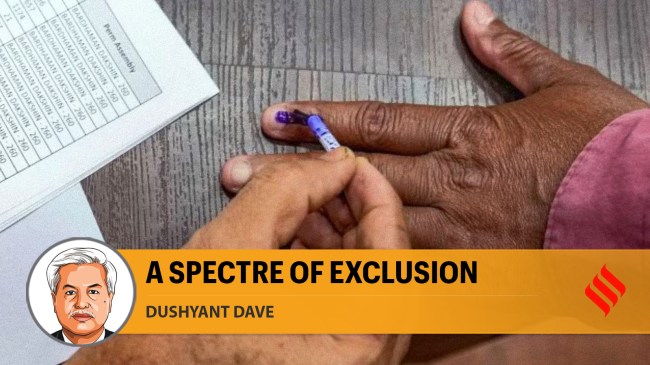Opinion Election Commission’s SIR in Bihar: A spectre of exclusion
It strikes at the heart of democracy’s promise
 The Supreme Court has even held that the Election Commission is not “imperium in imperio” under the Constitution.
The Supreme Court has even held that the Election Commission is not “imperium in imperio” under the Constitution. The Special Intensive Revision (SIR) initiated by the Election Commission (EC) in June 2025 has resulted in the exclusion of 6.5 million voters from the electoral rolls in Bihar, where Assembly elections are due in November. Article 326 of the Constitution says that elections to the Lok Sabha and state assemblies “shall be on the basis of adult suffrage, that is to say, every person who is a Citizen of India and who is not less than eighteen years of age” shall be entitled to be registered as a voter unless disqualified under the Constitution or the law on the grounds of “non-residence, unsoundness of mind, crime or corrupt or illegal practice”.
In effect, millions of citizens have overnight become non-citizens, contrary to the Constitution and the law.
What an irony, considering that B R Ambedkar declared, “Franchise is the most fundamental thing in a democracy,” and the exclusion of any person entitled to be on the electoral rolls “merely as a result of the prejudice of a local government, or the whim of an officer… would cut at the very root of democratic government”.
According to Ambedkar, the Central Election Commission would ensure the preparation and revision of electoral rolls in ways “so that no injustice may be done to any citizen in India”.
While debating the new Article 324 (old 289), Ambedkar said, “the House affirmed without any kind of dissent that in the interests of purity and freedom of elections to the legislative bodies, it was of the utmost importance that they should be freed from any kind of interference from the executive”. Over the last decade, there has been continuous interference by the Modi government in the functioning of constitutional bodies, directly or indirectly raising serious questions about their independence.
Even in June 1949, in the Constituent Assembly (CA) debate, Ambedkar said, “It has been brought to the notice both of the Drafting Committee as well as the Central Government that in… provinces, the executive… is instructing or managing things in such a manner that those people who do not belong to them either racially, culturally or linguistically, are being excluded from… the electoral rolls.”
In 2025, such an exclusion is a reality, confirming Ambedkar’s fears.
Shibban Lal Saxena had serious doubts about the independence of the EC and argued that persons appointed to it must enjoy the confidence of “all parties”. K M Munshi warned, “Corrupt practices do not necessarily apply to the candidates. There may be corrupt practices by the government of the day.” Alladi Krishnaswamy Ayyar noted on November 8, 1948 that the boldest step taken by the CA was in the matter of “universal adult suffrage with a belief in the common man and in his power to shape the future of the country”.
The role of the Opposition was also discussed extensively in the CA. Z H Lari said, “…it is not in our interest but in the interests of Democracy that there should be proper opposition which is constructive and charged with a duty to the country.” Naziruddin Ahmad even said, “Sir, opposition in a democratic house is a great necessity… if we cannot ensure any opposition, we should rather call the Constitution that of an ‘undemocratic, sovereign republic’.” He feared that, “As soon as some criticism is made, some members of the majority party get impatient. As soon as arguments are advanced, the so-called prestige of the government is supposed to be at stake, and therefore those arguments are opposed, resented, and sometimes treated with indifference and contempt.” Do we not see this behaviour by the ruling party today, inside and outside Parliament?
Ambedkar said on December 17, 1948, “that in our view democracy does not mean a police state, where a secret police can arrest or liquidate people without trial. It does not mean a totalitarian state where one party can seize power and keep opposition parties suppressed and not give them freedom to function freely and with equal facilities. It can not mean a society or state where an individual is made a robot or where they are reduced to a small screw in the big machine of the state”.
The current functioning of central investigating agencies, the repeated and unchecked “encounters” of citizens, and the gross and open abuse of state machinery and state media are all directed to promote the objectives of the party in power. This scenario tells us just how right Ambedkar was. Even Syama Prasad Mookerjee supported and echoed Ambedkar on that day: “We shall go ahead with our work in spite of all difficulties and obstacles and help to create that great India united and strong, which will be the motherland of not this community or that, not this class or that, but of every person… inhibiting this great land irrespective of race, caste, creed or community where everyone will have an equal opportunity, an equal freedom, an equal status.”
The Supreme Court has even held that the Election Commission is not “imperium in imperio” under the Constitution.
The philosophy, ideology, spirit and morality behind the Constitution of India can only be understood from these debates. The nation, its people, the executive, the ruling and Opposition parties, the EC and the constitutional courts must all strive to defend these ideals fiercely. A failure to do so will reduce this great nation to a dictatorship.
The writer is former president of the Supreme Court Bar Association





